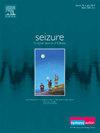CDK5RAP2作为局灶性癫痫无小头畸形致病基因的鉴定
IF 2.8
3区 医学
Q2 CLINICAL NEUROLOGY
引用次数: 0
摘要
目的CDK5RAP2基因编码细胞周期蛋白依赖性激酶活性的调节因子,在大脑发育中起重要作用。CDK5RAP2变异先前在原发性小头症-3患者中有报道,伴有或不伴有癫痫。本研究旨在探讨CDK5RAP2与癫痫之间的关系。方法对无获得性病因的特发性局灶性癫痫患者进行三基全外显子组测序。分析了亚区域效应、基因型-表型相关性和蛋白质-蛋白质相互作用,以揭示基因-疾病关联。结果在4例不相关病例中鉴定出4个复合杂合CDK5RAP2变异。这些变异在对照组中没有或极低的等位基因频率,并且在统计上显示比对照组的频率更高。这些变异被预测有氢键的改变,蛋白质稳定性下降,以及疏水性的显著改变。所有患者均为局灶性癫痫,无小头畸形。其中一例患者有两个位于功能域的配对错义变体变体,表现出难治性癫痫发作,而另一例患者有功能域以外的变体,则没有癫痫发作,这表明可能存在亚区域效应。癫痫组的错义变异比例显著高于原发性小头畸形组,提示可能存在基因型-表型相关性。蛋白-蛋白相互作用分析显示,CDK5RAP2与31个蛋白具有高可信度相互作用,其中13个基因与癫痫和神经发育障碍相关,提示CDK5RAP2与癫痫存在潜在关联。结论cdk5rap2是局灶性癫痫无小头畸形的新致病基因。本文章由计算机程序翻译,如有差异,请以英文原文为准。
Identification of CDK5RAP2 as a causative gene of focal epilepsy without microcephaly
Objective
The CDK5RAP2 gene, which encodes a regulator of cyclin-dependent kinase activity, plays a vital role in brain development. CDK5RAP2 variants have been previously reported in patients with primary microcephaly-3, with or without epilepsy. This study aimed to investigate the association between CDK5RAP2 and epilepsy.
Method
Trio-based whole-exome sequencing was performed in patients with idiopathic focal epilepsy without acquired causes. Sub-regional effects, genotype-phenotype correlation, and protein-protein interactions were analysed to reveal gene-disease association.
Results
Four compound heterozygous CDK5RAP2 variants were identified in four unrelated cases. These variants had no or extremely low allele frequencies in the controls and showed statistically higher frequencies than those in the controls. These variants were predicted to have changes in hydrogen bonds, decreased protein stability, and significant alterations in the hydrophobicity. All patients had focal epilepsy without microcephaly. Patient in one case with two variants of paired missense variants located at the functional domain showed refractory seizures, whereas another patient with variants outside functional domains was seizure-free, suggesting a potential sub-regional effect. The proportion of missense variants in the epilepsy group was significantly higher than that in the primary microcephaly group, suggesting a potential genotype-phenotype correlation. Protein-protein interaction analysis showed that CDK5RAP2 interacted with 31 proteins with high confidence, of which 13 genes were associated with epilepsy and neurodevelopmental disorders, suggesting a potential association between CDK5RAP2 and epilepsy.
Conclusion
CDK5RAP2 is a novel causative gene for focal epilepsy without microcephaly.
求助全文
通过发布文献求助,成功后即可免费获取论文全文。
去求助
来源期刊

Seizure-European Journal of Epilepsy
医学-临床神经学
CiteScore
5.60
自引率
6.70%
发文量
231
审稿时长
34 days
期刊介绍:
Seizure - European Journal of Epilepsy is an international journal owned by Epilepsy Action (the largest member led epilepsy organisation in the UK). It provides a forum for papers on all topics related to epilepsy and seizure disorders.
 求助内容:
求助内容: 应助结果提醒方式:
应助结果提醒方式:


